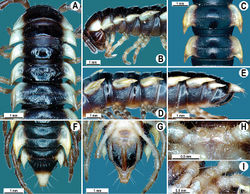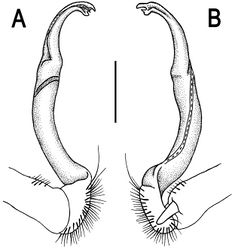Orthomorpha cambodjana
| Notice: | This page is derived from the original publication listed below, whose author(s) should always be credited. Further contributors may edit and improve the content of this page and, consequently, need to be credited as well (see page history). Any assessment of factual correctness requires a careful review of the original article as well as of subsequent contributions.
If you are uncertain whether your planned contribution is correct or not, we suggest that you use the associated discussion page instead of editing the page directly. This page should be cited as follows (rationale):
Citation formats to copy and paste
BibTeX: @article{Likhitrakarn2014ZooKeys374, RIS/ Endnote: TY - JOUR Wikipedia/ Citizendium: <ref name="Likhitrakarn2014ZooKeys374">{{Citation See also the citation download page at the journal. |
Ordo: Polydesmida
Familia: Paradoxosomatidae
Genus: Orthomorpha
Name
Orthomorpha cambodjana (Attems, 1953) – Wikispecies link – Pensoft Profile
- Pratinus cambodjanus Attems 1953[1]: 168 (D).
- Orthomorpha cambodjana – Jeekel 1963[2]: 265 (M); 1964[3]: 361 (M, D); 1968[4]: 56 (M); Hoffman 1977[5]: 700 (M); Golovatch 1998[6]: 42 (M, D); Likhitrakarn et al. 2011[7]: 66 (D).
Material examined
2 ♂ (CUMZ), Laos, Attapu Province, Xaysetha District, Ban Kasom, 116 m a.s.l., 15°06'27"N, 106°51'14"E, 16.10.2013, leg. C. Sutcharit and W. Siriwut.
Descriptive notes
Length 32–35 mm (♂), width of midbody pro- and metazona 2.6–2.7 and 3.8–3.9 mm (♂), respectively.
Coloration in alcohol, after one month of preservation, blackish (Fig. 4A–F), paraterga and epiproct light yellow to whitish yellow; venter, legs and antennae whitish to pale brown distally (Fig. 4A–I). Antennae reaching segment 3 when stretched dorsally. Paraterga very strongly developed (Fig. 4A–G), anterolateral edge clearly convex. Calluses on paraterga 2 and 3 delimited by a sulcus only dorsally, following paraterga by a sulcus both dorsally and ventrally, strongly bordered. Pleurosternal carinae complete crests only in segment 2 (Fig. 4B, D, E), a small, sharp, caudal tooth in segments 3–7, a very faint tubercle until segment 15. Legs long and slender, midbody ones ca 1.1–1.3 times as long as body height, prefemora without modifications, tarsal brushes present until ♂ leg 7.
Gonopod solenophore with a tridentate tip (Figs 5, 6), dorsalmost prong being subacuminate, longer than both others, whereas middle denticle shortest and pointed.
Remarks
This species has hitherto been known only from a ♂ lectotype and a ♀ paralectotype, currently both rather strongly faded, taken at Sre-Umbell, Kampot Province, southern Cambodia (Attems 1953[1], Likhitrakarn et al. 2011[7]). The above fresh samples show only slight variations, mainly a darker coloration, as opposed to the types which have recently been redescribed in due detail (Likhitrakarn et al. 2011[7]). This species is thus new to the fauna of Laos, suggesting a far wider distribution in Indochina.
Taxon Treatment
- Likhitrakarn, N; Golovatch, S; Panha, S; 2014: The millipede genus Orthomorpha Bollman, 1893 in Laos (Diplopoda, Polydesmida, Paradoxosomatidae), with descriptions of new species ZooKeys, 374: 1-22. doi
Other References
- ↑ 1.0 1.1 Attems C (1953) Myriopoden von Indochina. Expedition von Dr. C. Dawydoff (1938–1939). Mémoires du Muséum national d’ Histoire naturelle, série A, Zoologie 5(3): 133-230.
- ↑ Jeekel C (1963) Paradoxosomatidae from Borneo (Diplopoda, Polydesmida). Tijdschrift voor Entomologie 106: 205-283.
- ↑ Jeekel C (1964) A new species of Orthomorpha Bollman from Thailand observed in migration, with taxonomic notes on the genus (Diplopoda). Tijdschrift voor Entomologie 107: 355-364.
- ↑ Jeekel C (1968) On the classification and geographical distribution of the family Paradoxosomatidae (Diplopoda, Polydesmida). Academisch Proefschrift (PhD Thesis, privately published), Rotterdam, 162 pp.
- ↑ Hoffman R (1977) Diplopoda from Malayan caves, collected by M. Pierre Strinati. Revue suisse de Zoologie 84(3): 699-719.
- ↑ Golovatch S (1998) On several new or poorly-known Oriental Paradoxosomatidae (Diplopoda Polydesmida), VI. Arthropoda Selecta 6(3–4): 35–46 [for 1997].
- ↑ 7.0 7.1 7.2 Likhitrakarn N, Golovatch S, Panha S (2011) Revision of the Southeast Asian millipede genus Orthomorpha Bollman, 1893, with the proposal of a new genus (Diplopoda, Polydesmida, Paradoxosomatidae). ZooKeys 131: 1-161. doi: 10.3897/zookeys.131.1921
Images
|


